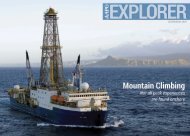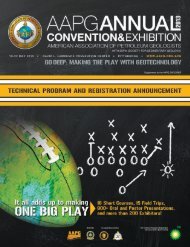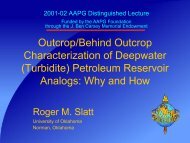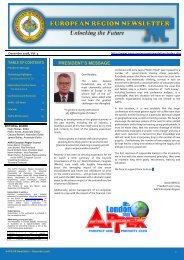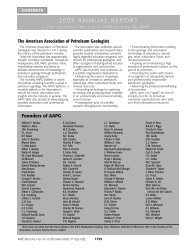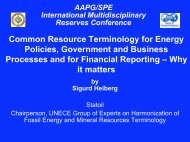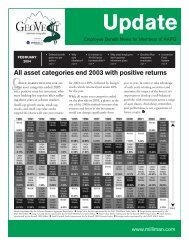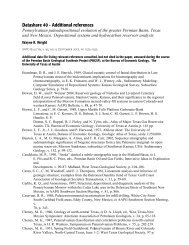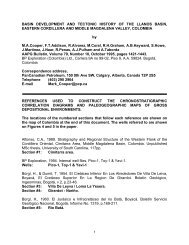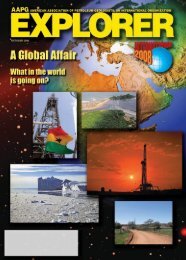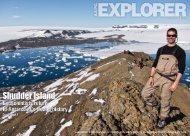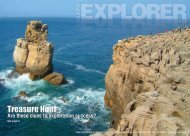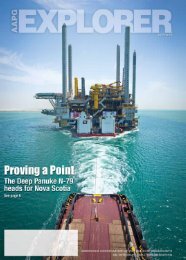Download - American Association of Petroleum Geologists
Download - American Association of Petroleum Geologists
Download - American Association of Petroleum Geologists
Create successful ePaper yourself
Turn your PDF publications into a flip-book with our unique Google optimized e-Paper software.
McGraw<br />
from page 64<br />
to provide several families with potable<br />
water after the Pennsylvania Department <strong>of</strong><br />
Environmental Protection found water wells<br />
there were tainted by shale gas drilling.<br />
He’s now skeptical about the hype<br />
surrounding estimates <strong>of</strong> unconventional<br />
gas reserves – and the idea that the United<br />
States may become the Saudi Arabia <strong>of</strong><br />
global gas supply.<br />
“We’re not going to be the Saudi Arabia<br />
<strong>of</strong> natural gas,” he said. “What we’re likely<br />
to be is the Nigeria <strong>of</strong> natural gas.”<br />
‘A Larger Theology’<br />
In his career as a freelance journalist,<br />
McGraw’s writing has appeared in<br />
such diverse publications as Popular<br />
Mechanics, Reader’s Digest, Playboy and<br />
Spin. He’d decided to give up journalism<br />
when the Marcellus shale events came<br />
along.<br />
“Nearly three decades <strong>of</strong> writing for<br />
newspapers and magazines, in a career<br />
that had never provided more than a<br />
meager and unreliable income, had left<br />
me frustrated, angry and pretty much<br />
dead broke,” he wrote in the<br />
acknowledgments for “The End<br />
<strong>of</strong> Country.”<br />
As a final gesture, McGraw<br />
wrote a proposal for a<br />
book based on his family’s<br />
experiences and the Marcellus<br />
play, expecting and half-hoping<br />
it would fail.<br />
That wasn’t a mistake.<br />
People who don’t write much<br />
and don’t write for money <strong>of</strong>ten<br />
think <strong>of</strong> writing as a special<br />
talent or skill. People who write<br />
a lot and write for money tend to think <strong>of</strong><br />
writing as a chronic disease.<br />
McGraw’s only mistake was in thinking<br />
there’s a cure.<br />
As it happened, his proposal for “The<br />
End <strong>of</strong> Country” drew considerable interest<br />
and ended up in a bidding tug-<strong>of</strong>-war<br />
between major publishers. McGraw is now<br />
at work on another book, a ground-level<br />
look at the debate over climate change.<br />
“The idea is that if we can pry the<br />
discussion away from the talking heads<br />
and talk to the hearts, maybe we can start<br />
to find common ground,” he said.<br />
Too <strong>of</strong>ten, McGraw observed,<br />
people will take a position on an issue<br />
like hydraulic fracturing based on<br />
preconceived notions and their personal<br />
belief systems, not on experience and<br />
research and facts.<br />
“When I find out where somebody<br />
stands on this issue, I can tell with<br />
frightening accuracy where they stand<br />
on five or six or seven or eight other hotbutton<br />
issues. And that’s absolutely tragic,”<br />
McGraw said.<br />
“It’s not being evaluated on its merits,”<br />
he noted. “It’s being evaluated as part <strong>of</strong> a<br />
larger theology.”<br />
Comfortably Numb<br />
McGraw’s luncheon talk at the AAPG<br />
meeting is titled “Comfortable in Our<br />
Ignorance.” The title comes from an<br />
experience he had at a lecture discussion.<br />
“This person stands up and cites a<br />
cataclysmic event here in Pennsylvania,”<br />
he recalled.<br />
The event was so<br />
remarkable it would have<br />
drawn intense coverage not<br />
only in the United States but<br />
around the word, McGraw<br />
said, if it had actually<br />
occurred.<br />
It hadn’t.<br />
“It never happened,” he<br />
said. “But this person wasn’t<br />
lying to me. I looked into this<br />
person’s eyes and knew this<br />
person absolutely believed it<br />
had happened.”<br />
After he asked a few questions,<br />
McGraw noticed “almost a look <strong>of</strong> terror”<br />
as the person realized the event might not<br />
have been real.<br />
McGraw said the individual stood up<br />
to leave and announced, “I am not going<br />
to argue with you. I am comfortable in my<br />
own ignorance.”<br />
EXPLORER<br />
AAPG<br />
EXPLORER<br />
Continued from previous page<br />
Life Lessons<br />
“Honestly, I didn’t know if I’d even like<br />
to work with kids. All I knew was I loved<br />
geology,” Bolhuis said. “It wasn’t until I spent<br />
considerable time in the classroom that I<br />
realized the kids are awesome.<br />
“They feed <strong>of</strong>f my energy just as I feed<br />
<strong>of</strong>f <strong>of</strong> theirs.”<br />
To engage his students at the beginning<br />
<strong>of</strong> a semester, Bolhuis first works at building<br />
a relationship with them.<br />
“It all starts with relationships,” he<br />
stressed. “Once a foundation <strong>of</strong> respect<br />
is established, the kids will respond to<br />
whatever is happening on any given day.”<br />
As for his method <strong>of</strong> teaching, he admits<br />
that’s a little more complicated.<br />
“We’ll do traditional labs, inquiry<br />
activities, lecture, field trips … whatever<br />
it takes,” he said, “to maintain a rigorous<br />
curriculum while doing my best to make my<br />
classroom the place where the kids want to<br />
be at that particular time.”<br />
With issues like “fracing, climate<br />
change, oil and gas reserves, mountaintop<br />
removal, diminishing fresh water and natural<br />
disasters” in the media daily, he said, “a<br />
teacher doesn’t need to look very hard to<br />
bring relevancy into the class.<br />
“It (geology) is always in the news,” he<br />
said, “perhaps more than any other field <strong>of</strong><br />
science.”<br />
Bolhuis’ creative teaching doesn’t stop<br />
in the classroom. He uses every chance to<br />
take his students outdoors to explore.<br />
“I take every opportunity to let students<br />
observe the magnificence <strong>of</strong> geology and<br />
learn to understand the power that caused<br />
it,” he said.<br />
But getting his students out in the field <strong>of</strong><br />
geology comes at a price – and to minimize<br />
bussing costs, Bolhuis obtained his CDL<br />
(commercial driver’s license) so he could<br />
drive the school bus to field trip sites.<br />
One student recalls the enthusiasm and<br />
energy Bolhuis brought to the classroom<br />
when he was his student.<br />
“He (Bolhuis) would get fired up about<br />
every lesson he taught,” he said, and<br />
“we (students) would tease him about his<br />
unceasing love <strong>of</strong> rocks.<br />
“His passion did not stop at the material,<br />
either,” the ex-student continued. “He was<br />
always weaving valuable life lessons into his<br />
lectures.”<br />
Bolhuis said he is fortunate to have a<br />
career that he loves. Teaching and making<br />
an impact on each <strong>of</strong> his students is a<br />
bonus.<br />
“I have to remind myself every day that I<br />
never know where my influence begins, nor<br />
where it ends,” Bolhuis said.<br />
“I want to make an impact,” he said. “I<br />
want to make a difference.”<br />
EXPLORER<br />
WWW.AAPG.ORG MAY 2013<br />
67



